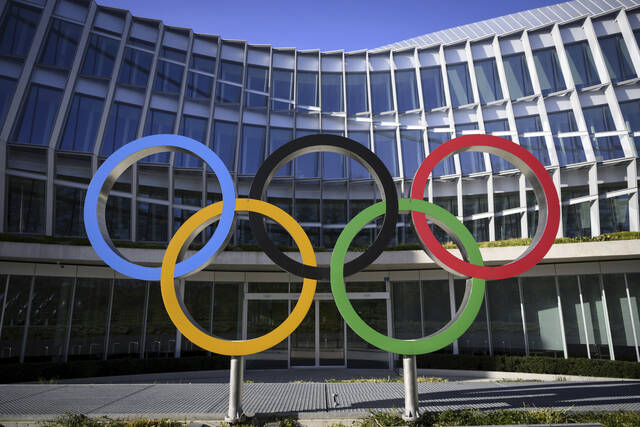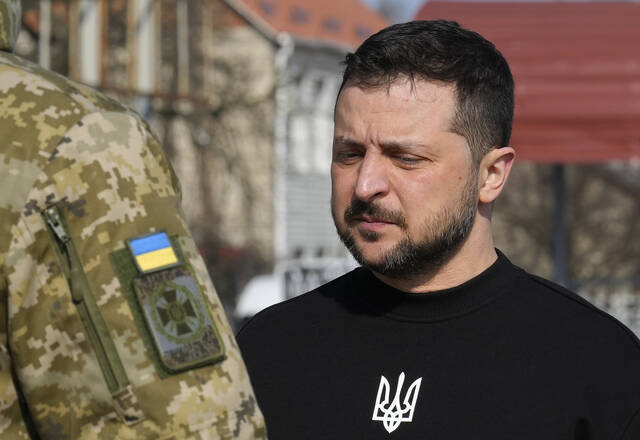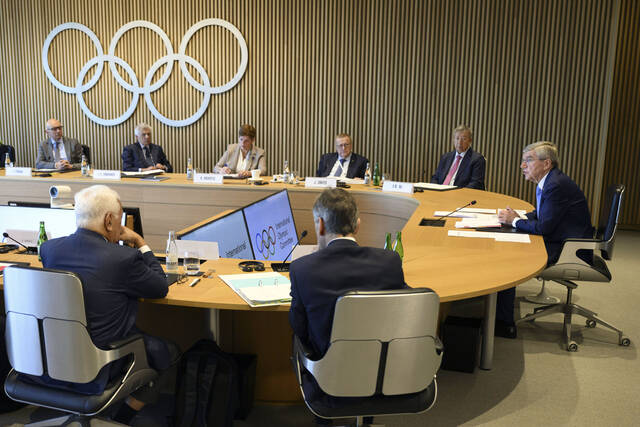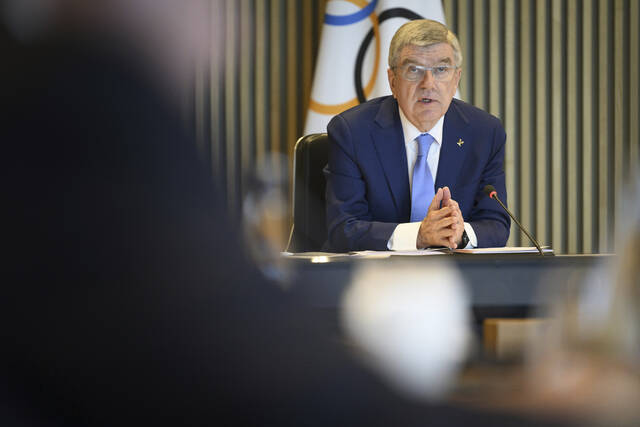IOC details advice to let Russia, Belarus athletes return
GENEVA — Russian athletes were given conditions Tuesday on how they could return to international sports events, though the International Olympic Committee said its advice to sporting bodies did not include the 2024 Paris Games.
Though the IOC gave guidance rather than orders to Olympic sports, it still defies repeated calls by Ukrainian President Volodymyr Zelenskyy to exclude all Russian athletes and teams while his country is being occupied and attacked.
Athletes from Russia and its military ally Belarus who have actively supported the war in Ukraine, or are “contracted to the military or national security agencies”, should not be cleared to compete as neutral individuals, IOC President Thomas Bach said.
The Russian Defense Ministry has said more than 20 of the country’s medalists at the Tokyo Olympics staged in 2021 held military ranks. Of the 71 medals won in Japan, 45 were by athletes affiliated with the Central Sports Club of the Army.
Russia and Belarus teams “cannot be considered” for a return in team sports, such as basketball, volleyball and soccer, Bach said at a news conference after a meeting of the executive board he chairs.
Team events such as relays or mixed doubles or team all-around in gymnastics should also be off limits, the IOC said in a document explaining its guidance.
In the guidance document, the IOC said it would like Russians and Belarusians to be known as Individual Neutral Athletes with the French acronym AIN.
They should wear uniforms that are either entirely white or a single color, and can’t have a team logo. Athletes should be barred from displaying their national flags on social media or making statements “that may be prejudicial to the interests of the competition, its integrity or the participant’s neutrality,” the 5-page document stated.
The IOC’s recommendations to the governing bodies of Olympic sports “do not concern” the Paris Games that opens in 16 months’ time.
“The IOC will take this decision at the appropriate time at its full discretion,” said Bach, adding “we are not kicking it down the road” when asked if the IOC was effectively buying time for the war to end.
In the Olympic Charter, article 44.3 states: “Nobody is entitled as of right to participate in the Olympic Games.”
The individual Olympic sports must now decide the entry and eligibility conditions for their events, which include ongoing qualifiers for the Paris Olympics.
The suggested conditions are stricter than when Russia was under sanctions for doping cases at each Winter and Summer Games since 2018. In those events, uniforms in national colors could be worn and music by Tchaikovsky was played when Russian athletes won gold medals.
The IOC also said that event organizers should not fly Russian or Belarusian flags and should try to prevent spectators bringing national flags into venues. Four fans with Russian flags, including one with an image of President Vladimir Putin, were evicted after they flew them at the Australian Open tennis event in January.
The IOC advice presented Tuesday marks a profound shift in sport’s position on Russia and Belarus in 2023, a year which began 10 months into a near-total exclusion by most governing bodies.
Within days of the war starting in February last year, the IOC urged sports bodies to isolate Russia and Belarus. It cited an “extremely grave violation” of the Olympic Truce in place for the 2022 Winter Games in Beijing, plus the integrity and security of sports events, including the unfairness that Russians could train in peace while Ukrainians athletes’ lives were disrupted.
In January, the IOC formally announced it would seek a “pathway for athletes’ participation in competition under strict conditions”, with a view to letting Russians and Belarusians try to qualify for the Paris Olympics.
Bach has repeatedly pointed to advice from independent U.N.-recognized human rights experts that excluding athletes based only on their passports would be discrimination.
On Tuesday, Bach said one factor that changed IOC thinking is some sports having already reintegrated neutral Russians and Belarusians, such as tennis and cycling. Soccer’s exclusion of Russian teams by FIFA and UEFA was upheld by the Court of Arbitration for Sport in Lausanne.
Zelenskyy — who Bach visited in Lviv last year — has consistently called for all Russian athletes and teams to be excluded. His call is backed by some governments and Olympic bodies in Europe and elsewhere.
Ukrainian athletes, including past and current Olympic medalists, have also publicly disagreed with the IOC’s stated “unifying mission” to bring the world together peacefully in sport.
The mayor of Paris, Anne Hidalgo, said there should be no Russian delegation in her city’s Olympics if the war in Ukraine continues.
Remove the ads from your TribLIVE reading experience but still support the journalists who create the content with TribLIVE Ad-Free.






